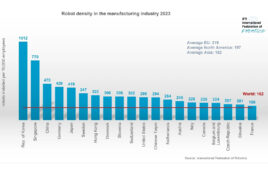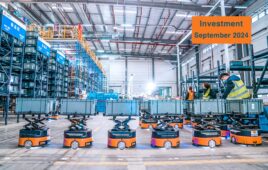|
Listen to this article
|

Robotic Crew founders at RoboBusiness 2023. Source: Ricardo Petrazzini
While U.S. companies have outsourced technology work overseas for more than 20 years, quality and political concerns have brought back design, programming, and other engineering tasks back closer to home. Robotic Crew offers staffing in Latin America for robot development, as well as operations and fleet management.
“About two years ago, we spun out of WeDevelop, a company that was providing software engineers,” said Ricardo Petrazzini, founder and CEO of Robotic Crew. “Robotics is at the stage software was at in 2005, and many vendors and integrators don’t yet realize how Latin American talent can help them.”
The Coral Gables, Fla.-based company said it can remotely handle electrical and software engineering tasks such as design and testing. It is one of two Latin American businesses offering such services, Petrazzini told The Robot Report.
“When I went to RoboBusiness 2023, I met a Ph.D. from MIT who said he was flying to China to understand how things work in factories there with people without high school training,” he recalled. “International networking is a must, and countries like Argentina are a huge untapped source of engineers.”
Robotic Crew promises to put humans in the loop
Not every vendor or end user has the resources for its own operations center, noted Petrazzini. Latin America offers an advantage over India of being in the same time zones as most North American daytime materials handling operations, helping to keep people in the loop affordably.
“We’re not providing hardware or software; we’re providing people. Within robotics, staffing for operations roles is a challenge,” he said. “We can offer good fees for a senior engineer with 10 years of experience with C++ or Python.”
Robotic Crew said it can work with any robotics operations, or RobOps, platform, such as those from InOrbit or Formant, because there’s still a need for people to manage robot fleets.
“If a company wants to operate 10,000 robots across multiple sites, having one person for four robots is prohibitive,” Petrazzini added. “Even as artificial intelligence helps us get to 1:50, you’d still need 200 people to monitor those 10,000 robots. But customers care more about uptime than the ratio of robots to staffers.”
“We can even host projects,” he said. “We have a partnership with a lab in Buenos Aires, and the client becomes the remote guy. We also have office space in Austin, and I have been traveling across the U.S.”
Petrazzini sees a global opportunity
While it has started with logistics operations, Robotic Crew has met with both startups and mature companies in aerospace, maritime, automotive manufacturing, healthcare, and integration and consulting. It has been in talks with a company working in kitchen robotics.
“We’re having three to four discovery calls per week, and our goal is to become the best-known RobOps staffing company to the U.S.,” said Petrazzini. “We also offer a good deal for engineers in Latin America, compared with their salaries at a petrol company or a multinational.”
He plans to be at RobOpsCon and RoboBusiness 2024 next week in Silicon Valley.
“InOrbit was one of the first companies I met at last year’s show, and since then, a lot of people have been asking me about RobOps,” Petrazzini said. “The geopolitical rivalry between the U.S. and China has forced robotics suppliers and operators to rethink how they do things, providing an opportunity for Latin America.”







Tell Us What You Think!